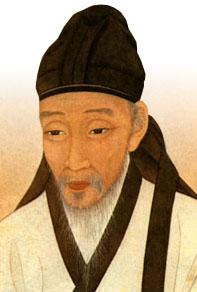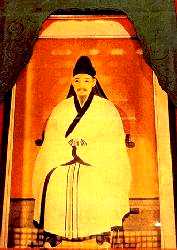
Yul Gok
 "Did you know that Toi-Gye knew Yul-Gok?" I ask Kevin before we run through the Yul-Gok form.
"Did you know that Toi-Gye knew Yul-Gok?" I ask Kevin before we run through the Yul-Gok form.He looks at me kind of funny.
"See, they were both scholars and lived at the same time. Like a couple of college professors, chatting together about their studies . . ."
This is the danger of trying to learn the meaning of my form: odd looks from TKD colleagues.
Of course, I should just memorize the little paragraph-long description of Toi-Gye ("Toi-Gye is the pen name of the noted scholar of Yi-Hwang (16th century A.D.), an authority on neo-Confucianism . . . ")
But the problem is, I start to wonder what the heck am I saying?
I mean, what is neo-Confucianism, anyway? It's got that little "neo" prefix, meaning it's "new" Confucianism . . . but I don't remember what Confucius taught. Or when he lived.
So I look this stuff up.
Confucius lived in 6th century China. He was a kind of philosopher/political consultant. Went around during a time of "moral laxity," teaching people how to be more moral and ethical in their behavior and how to act appropriately for your station in life. It's not a religion: no god(s) or heaven. It's more of a philosophy.
Much later, then, this guy Toi-Gye comes along (in 16th c. Korea) and professes neo-Confucianism. What's new about it? It blends Taoism and Buddhism (important religions at the time in Korea) with Confucius's ethics.
And, apparently, he knew Yul-Gok ("Yul-Gok is the pseudonym of the great philosopher Yi I . . ." ),!
See, it all ties together.
Still, I don't think I'd like to have my name on a form that includes a groin grab.

1 comment:
I love it! -- Nothing is better than an inquiring mind!
Unfortuntely, there are only a few Taekwondo "nerds" in my school as well, and really only one senior instructor takes the time to explain the historical significance of the forms . . . but it's fascinating!
Kicker Chick
Post a Comment